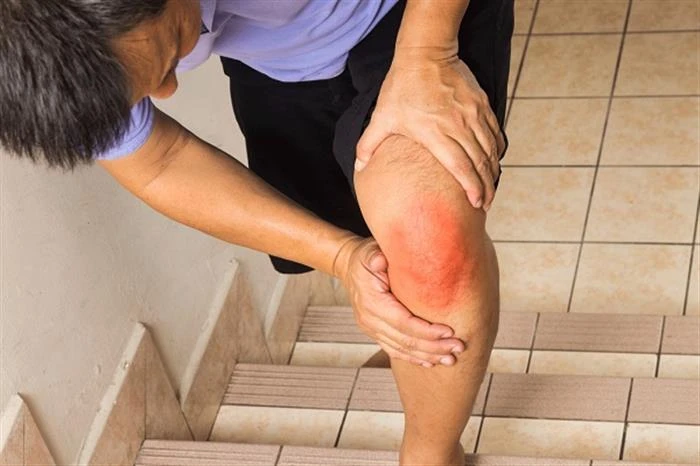
To see patients' reviews
Click hereKnee problems: causes and modern treatment methods


Knee problems are among the most common health problems, most notably knee osteoarthritis, which directly affects mobility and quality of life. With medical advances, new techniques have emerged that help relieve pain and improve mobility without surgical intervention. One of the most prominent is treating knee osteoarthritis with hyaluronic acid.
In this article, we discuss in detail: Hyaluronic acid injections for knee osteoarthritis. How do these injections work? Who are the patients who are candidates for them? What are their most important benefits and potential complications? We also explain why Dr. Mohamed Koura is considered the best doctor for treating osteoarthritis and knee problems.
What is hyaluronic acid for knee osteoarthritis?
Hyaluronic acid injections for treating knee osteoarthritis are a common treatment for knee problems. They are often referred to as "oil injections" due to their role in lubricating the joint and reducing friction. These injections contain a natural substance naturally produced by the joint, which helps improve mobility and relieve pain. This type of injection is typically used for mild to moderate knee osteoarthritis, where it helps restore joint flexibility and effectively reduce symptoms. Treatment results last for six months to a full year in most cases.
How do hyaluronic acid injections work for knee osteoarthritis?
Hyaluronic acid injections for knee osteoarthritis are not just painkillers; they also improve the overall joint environment:
Improved lubrication: Increased viscosity of the joint fluid to reduce friction.
Reduced inflammation: Reduced swelling and stiffness.
Pain relief: Reduced pain signals transmitted to the nerves.
Cartilage protection: Forming an insulating layer that reduces cartilage wear.
Stimulated the body's natural production of hyaluronic acid.
Suitable cases for hyaluronic acid injections:
Patients with moderate osteoarthritis whose condition has not improved with medication or physical therapy.
Those suffering from knee problems who are unable to use painkillers due to chronic conditions such as heart, kidney, or diabetes.
People who wish to postpone surgery or are unable to undergo it. Patients seeking a safe alternative to reduce pain and improve mobility.
Steps for Hyaluronic Acid Injections for Knee Osteoarthritis
Preparation: Sterilize the injection site and apply a local anesthetic.
Drain excess fluid: If the knee is swollen.
Direct injection: Injecting hyaluronic acid into the joint under the supervision of a specialist.
The injections are usually performed once or in weekly sessions, depending on the condition.
Expected Results, Side Effects, and Post-Injection Advice
After hyaluronic acid injections for knee osteoarthritis, the patient notices a significant improvement in mobility and reduced pain within just a few weeks. The effects of the injections typically last from six months to a full year. This procedure also helps postpone the need for surgical intervention in many cases.
Although hyaluronic acid injections for knee osteoarthritis are safe in most cases, some minor side effects may occur, such as redness or slight swelling at the injection site or temporary knee pain. Inflammation or sensitivity is rare, however. Therefore, it is always recommended to consult the best doctor for treating knee problems to ensure a proper diagnosis and a safe procedure.
After hyaluronic acid injections for knee osteoarthritis, it's best to adhere to several basic tips, such as avoiding strenuous activity or lifting heavy weights for two days, and being content with relative rest and short walks. This is in addition to regular follow-up visits with your doctor to evaluate results and monitor improvement.
Dr. Mohamed Koura - The Best Doctor for Treating Knee Problems
If you're looking for the best center for treating osteoarthritis and knee problems, Dr. Mohamed Koura is a prominent name in this field, thanks to his extensive experience in using the latest non-surgical treatments, such as hyaluronic acid injections for knee osteoarthritis and radiofrequency ablation.
A thorough diagnosis and a comprehensive treatment plan ensure you eliminate pain, regain mobility, and return to your normal life without surgery. Treating knee osteoarthritis with hyaluronic acid injections is an effective and safe option for alleviating the symptoms of knee problems, improving mobility, and postponing surgical intervention. Choosing the best doctor for treating knee problems, such as Dr. Mohamed Koura, and the best center for hyaluronic acid injections for knee osteoarthritis, guarantees you outstanding results and comprehensive care.
Dr. Mohamed Koura is here to assist you using the latest therapeutic techniques, including thermal radiofrequency and laser treatments for spinal pain without surgery—book your appointment now from here.
Why Choose Dr. Mohamed Koura ?
Simply because he is the best doctor in his feild. He stays updated on the latest treatment technologies through his participation in various international conferences with leading foreign doctors and experts. Finally, and most importantly, Dr. Mohamed Koura is the best doctor in Egypt and the Arab world, possessing 12 non-surgical techniques for treating spinal and joint problems. He was the first to introduce modern interventional treatment techniques in Egypt & the Middle East and is the only one using the disc fx technique to treat spinal pain.
To see patients' reviews
Click hereCertainly not, some cases must be treated surgically, and the most appropriate technique for the patient is determined through a medical examination and the presence of imaging studies.
No, it is necessary to make a reservation through a phone call or social media messages.
There are no risks or side effects associated with non-surgical pain interventions.
The patient needs only 3 to 4 days before they can travel comfortably, and the hospital stay does not exceed 6 to 8 hours.
A condition cannot be accurately assessed and a proper medical diagnosis made without a medical examination and recent imaging studies.
Yes, there are several payment methods available through Visa or electronic wallets by making a reservation on our website.
Certainly, obesity is one of the causes of knee osteoarthritis.
Radiofrequency activates the nerve and does not cause any damage to it.
Non-surgical interventions are a definitive treatment for some cases and pain relievers for other cases, which is determined by the doctor through a medical examination.
If the herniated disc is fully treated, there is a possibility of it reoccurring in some cases, such as not following the doctor's prescribed instructions after the intervention, experiencing an accident, or making a sudden wrong movement like lifting heavy objects.
The entire disc is not removed due to the presence of several risks and it may exacerbate the condition. Only the protruding part that causes pain is removed.
This cannot be done with radiofrequency, but it is performed through other techniques that Dr. Koura conducts.
The success or failure of non-surgical interventions cannot be judged through radiographic imaging because these procedures involve making subtle changes to critical parts to address the issue. Consequently, they do not produce significant changes to avoid potential complications in the future or damage to the spine and joints, which is our primary goal.
Spinal stenosis does not typically cause sciatica. In most cases, disc herniation is what may lead to sciatica. This does not necessarily mean that a patient with sciatica will also have spinal stenosis.
Sciatica may return if the patient does not adhere to the medical instructions provided by the doctor or in the event of an unexpected accident.
Lower back pain can result from several causes, including a herniated disc, nerve compression, muscle strain, or chronic spinal injuries. Lifestyle factors such as prolonged sitting, muscle weakness, and excess weight can also exacerbate the problem.
A life without pain without surgery
Once you book with Dr. Koura
Get rid of pain with just one call.. Book your appointment now with pain Management consultant Dr. Koura.






-webp.webp)




-webp.webp)
































